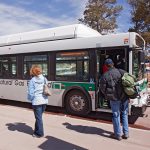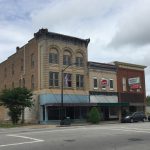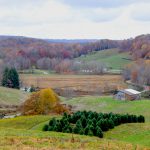All Case Studies
Arkansas
Helena-West HelenaUpdated: 2022
Severe economic decline leads civic leaders from two small communities in the Mississippi Delta to set aside historic rivalries and work together to save their towns. This story is about an inclusive community-wide planning and implementation process to bridge economic development, housing, education, leadership development and health care.
MorriltonUpdated: 2022
In Morrilton, two of the town’s largest employers close their doors in the same week. A coalition of community leaders responds quickly to form partnerships and implement job training programs for the dislocated workers.
California
Rio DellUpdated: 2022
This is a story about small steps making a big difference. Once a run-down community with an inferiority complex, Rio Dell took simple steps to clean up the town and re-invigorate civic pride.
Georgia
ColquittUpdated: 2022
Colquitt uses the arts as a tool for community empowerment and economic diversification. The success of a community-based performing arts project has resulted in extensive downtown revitalization and economic development.
DouglasUpdated: 2022
Douglas cultivates economic development from three angles— by intensifying entrepreneurship and small business efforts, by diversifying industrial recruitment and employers, and by preparing a cadre of new leaders to move the community’s vision forward.
Indiana
ReynoldsUpdated: 2022
A small town with 550 people and 150,000 hogs turns an agricultural waste product into an economic asset. By converting waste from hog farming into a local energy supply, Reynolds is working to become the first energy self-sufficient community in America.
Iowa
FairfieldUpdated: 2022
After losing Parsons College, the town’s main economic anchor, civic leaders in Fairfield took a risk and sold the campus to an alternative California university—a move that would lead to unique town-gown relations and ultimately play a role in Fairfield’s rich diversity, strong civic infrastructure, and pioneering entrepreneurial networks.
Maryland
OaklandUpdated: 2022
Oakland demonstrates that the arrival of Wal-Mart need not be a death knell for small, local businesses. Through the Main Street Program, Oakland works with existing business owners to prepare for the arrival of Wal-Mart.
Minnesota
HoustonUpdated: 2022
The Houston public school system capitalizes on an opportunity to partner with a private sector entity to develop an online learning curriculum.
New York MillsUpdated: 2022
This town invests in the creative energy of rural artists. Through a regional cultural center, New York Mills attracts outside talent and energy into their town, bringing fresh perspective on the community’s challenges and opportunities.
Pelican RapidsUpdated: 2022
Pelican Rapids is a diverse rural community where eighteen different languages are spoken in the elementary school. By developing cross-cultural learning opportunities and a youth soccer league, this community capitalizes on the entrepreneurial talents of local immigrants.
Mississippi
HollandaleUpdated: 2022
Recognizing that the availability of public transportation would enhance its economic development prospects, Hollandale partners with its neighboring communities to design, test, and implement an innovative rural transportation network.
Missouri
BransonUpdated: 2022
Branson, with a local economy reliant on theater-based tourism, doesn’t rest on its laurels. Local leaders pursue a large mixed-use project to diversify Branson’s economy and to increase year-round employment.
ChillicotheUpdated: 2022
Upon learning that its major employer will be closing, civic leaders in Chillicothe band together to save a correctional facility that has become a valuable part of this town’s economic and civic life.
Nebraska
OrdUpdated: 2022
In the face of dramatic population decline, Ord builds local capacity to pursue its four pillars of community economic development: youth outreach, leadership development, philanthropy, and entrepreneurship.
North Carolina
AydenUpdated: 2018
Instead of allowing failed projects from the past to depress the community further, Ayden creates a new vision, enables local residents to implement the vision and revitalizes both downtown and a sense of civic pride.
Bakersville and HayesvilleUpdated: 2022
Two small rural communities in the mountains of North Carolina build civic infrastructure and partnerships, and boost tourism by elevating heritage and cultural assets and revitalizing downtown.
BelmontUpdated: 2022
Belmont paired an emergency small business loan program with the “Keep the Lights on in Belmont” program to drive residents to support local enterprises and raise funds for an emergency relief grant for downtown businesses.
Black MountainUpdated: 2022
This small town bridges a thriving local arts scene with economic development to restore its cultural identity and enlarge the tax base.
BrevardUpdated: 2022
Brevard capitalizes on the economic value of retirees, and not just as consumers. Local retirees assemble an award-winning network of “consultants,” who support new and existing businesses.
Burke CountyUpdated: 2022
The Carolina District pivoted its work in response to COVID-19 and subsequent demand for personal protective equipment (PPE) and cloth face coverings, supplying hospitals and public-school systems, among other clients throughout North Carolina.
Caldwell CountyUpdated: 2022
Caldwell Community College and Technical Institute leveraged an existing relationship with Google to improve broadband access and obtain 75 Chromebooks.
Center for Advanced Hindsight – DurhamUpdated: 2021
The Center for Advanced Hindsight (CAH) at Duke University partnered with the NC State College of Design, Cabarrus County, Catawba County, Gaston County, Haywood County, and Union County to use insights from behavioral science and design to improve community response to COVID-19.
Chimney RockUpdated: 2022
A downtown makeover and the construction of a river walk, joining Chimney Rock’s business district to the Rocky Broad River, spurs the creation of new businesses.
DavidsonUpdated: 2022
Davidson preserves its small town character in the face of development pressure from nearby Charlotte.
DillsboroUpdated: 2018
Dillsboro turned an environmental pollutant into an economic asset by converting landfill methane gas into energy to power local artists’ studios at the Jackson County Green Energy Park. The results include new businesses and jobs for the community.
DurhamUpdated: 2022
Achieving Economic Development through Mission-Oriented Real Estate Development
EdentonUpdated: 2018
Elected officials in Edenton partner with an historic preservation non-profit organization to turn the dilapidated Edenton Cotton Mill into a new economic asset for the community.
ElkinUpdated: 2018
Elkin builds on the local craft economy by investing in an artisan craft guild and an apprenticeship program. The apprenticeship program provides craft training and mentorship, as well as small business skills to artisan entrepreneurs.
FarmvilleUpdated: 2022
A historically tobacco-dependent community, Farmville ensures its long-term vitality through diversification. Today, furniture, health care, construction, warehousing and service industries can all be found thriving in this small North Carolina town. Farmville invests in local businesses and schools, and markets itself to new industries and residents.
FayettevilleUpdated: 2022
The City of Fayetteville, NC expanded on an existing small business loan program to fund emergency grants intended to keep businesses from shutting down in the area. Through a dense network of partnerships, the City was able to target assistance to the businesses that needed it most.
Gaston CountyUpdated: 2022
Leadership in Gaston County noticed that reports of child abuse significantly decreased during the COVID-19 pandemic. The assistant county manager gathered community stakeholders to address process improvements for reporting to ensure the wellbeing of children and families.
HillsboroughUpdated: 2017
With an identity proudly rooted in its small town history, and a location ideal for commercial development, Hillsborough strikes a savvy balance between preservation of its past and growth for its future.
JacksonvilleUpdated: 2022
Jacksonville, North Carolina has established the Utility Assistance Program in order to ensure that the city’s citizens have their basic needs covered during the COVID-19 pandemic.
New BernUpdated: 2022
New Bern, NC took a collaborative approach to maintain tourism and support small businesses, leveraging statewide resources and running several local programs to ensure that local businesses could reopen and position the town as a safe travel destination.
OxfordUpdated: 2022
Located 30 miles north of the booming Research Triangle Park, Oxford is partnering with Granville County and its neighbors to implement a “mini-hub” approach to economic development. The strategy is to prepare relatively low-cost industrial sites that are attractive to companies that need to be near the Research Triangle, but not in it.
Pasquotank and Perquimans CountiesUpdated: 2022
Two rural counties in northeastern North Carolina partner together to land a renewable energy development that boosts the tax base and provides new income to agricultural land owners.
Person CountyUpdated: 2022
Person County introduces a rapid short-term loan for local small businesses to combat economic downturn from COVID-19 and ensure the longevity of the community.
SanfordUpdated: 2022
A small yet strong manufacturing community grows through diverse industry recruitment, strategic partnerships, and intentional leadership in Lee County, NC.
Scotland NeckUpdated: 2018
Strong mayoral leadership leads this small town to implement new strategies for addressing old challenges. Scotland Neck helps its small businesses to attract tourists and attracts new industries that can employ the local workforce.
Siler CityUpdated: 2022
This small town is capitalizing on the economic value of arts-based small businesses. Through a unique partnership with a regional community college, Siler City is nurturing the creativity and entrepreneurship of local artists.
SpartaUpdated: 2022
Through a regional collaboration, Sparta and neighboring communities are laying the groundwork for a cluster of advanced materials businesses. As a key partner in the effort, Sparta is focused on workforce training, infrastructure development and private sector participation in the partnership.
Spruce PineUpdated: 2022
Spruce Pine is at the center of western North Carolina’s craft and culture economy. By producing and marketing products from a children’s story, it is redefining economic development for others.
StarUpdated: 2022
In the wake of shuttered textile mills and climbing unemployment, Star joined with a regional non-profit partner to develop a business incubator, located in a former mill building, which provides space and training to local artisans.
TryonUpdated: 2022
A rural community that was cut-off from state-of-the-art broadband technology took matters into its own hands. Tryon financed and built a fiber optic network cable to provide its residents and businesses with broadband Internet access.
WadesboroUpdated: 2022
Wadesboro partnered with a regional community college to convert an abandoned textile mill complex into a tremendous economic asset. The Lockhart-Taylor Center includes space for a business incubator, entrepreneurship training, and public meeting space.
WashingtonUpdated: 2022
Located at the center of a regional cluster of marine and boat-building businesses, Washington partners with the community college to create a workforce development and entrepreneurship program to capitalize on the booming industry.
Wilson County
After building Greenlight, North Carolina’s first and only community-owned fiber network, Wilson County needed fiber technicians to install and maintain the network’s growing infrastructure. To meet this workforce need, Wilson County leveraged its unique assets in the tech industry to develop fiber optics training for anyone looking to develop skills in the industry. The fiber optics training program was such a success that in 2019 the County worked to expand the program and increase access to it. By leveraging its existing strengths in tech and creating workforce opportunities for residents, the County worked to expand tech opportunities across the region.
Yancey CountyUpdated: 2022
Yancey County supports two of its economic development strategies, tourism and business development, by offering Downtown Entrepreneurship Assistance Grants to small business owners.
North Dakota
RugbyUpdated: 2022
Recognizing the lack of computer skills among its workforce, Rugby partnered with a state-wide training program to enhance the job skills of its citizenry. Its investment in workforce development is attracting new businesses to Rugby.
Ohio
NelsonvilleUpdated: 2022
Civic leaders in this historic coal mining community subsidized downtown storefront rent for artist-retailers. Over a period of five years, artists cleaned up downtown storefronts and brought the town’s downtown square back into economic productivity.
Oregon
DoraUpdated: 2022
In Dora, a major renovation of the fire station, library and community center is intended to spark further investment in this small rural town.
South Carolina
AllendaleUpdated: 2022
A small rural community in South Carolina creates a leadership institute to cultivate local leadership, generate grant funding, and to confront the racial divide.
Tennessee
EtowahUpdated: 2022
Etowah’s persistence and high standards yielded one of the most scenic rail trips in the nation, an attraction that is spurring downtown retail, restaurant and hospitality development and innovative approaches to industrial recruitment.
Virginia
AbingdonUpdated: 2022
The Barter Theatre, a staple tourist attraction in Abingdon, VA, was forced to indefinitely close its doors when the pandemic hit. The Barter then created “Barter at the Moonlite,” repurposing a former drive-in movie theater in the community for performances. The venue serves as an innovative way to continue attracting tourists to the area.
Big Stone GapUpdated: 2022
This town’s choice to embrace ecotourism and to support local entrepreneurs is transforming the local economy and providing residents with a sense of accomplishment and independence from the control of industry outsiders.
Cape CharlesUpdated: 2020
With a local economy crippled by plant closures and environmental problems, Cape Charles bridges these challenges with the nation's first eco-industrial park.
Washington
PuyallupUpdated: 2022
Through the Winter Ready Funds Program, the City of Puyallup awards one-time $5,000 grants (a total of $150,000) to eligible local restaurant and retail businesses for purchasing equipment and making other necessary adjustments to be able to serve customers outdoors during the pandemic restrictions.
West Virginia
Webster SpringsUpdated: 2022
A rural community creates a program to harness the town’s volunteer spirit. The Webster County Community Fund is providing grants to initiatives that enhance quality of life in Webster Springs.








































